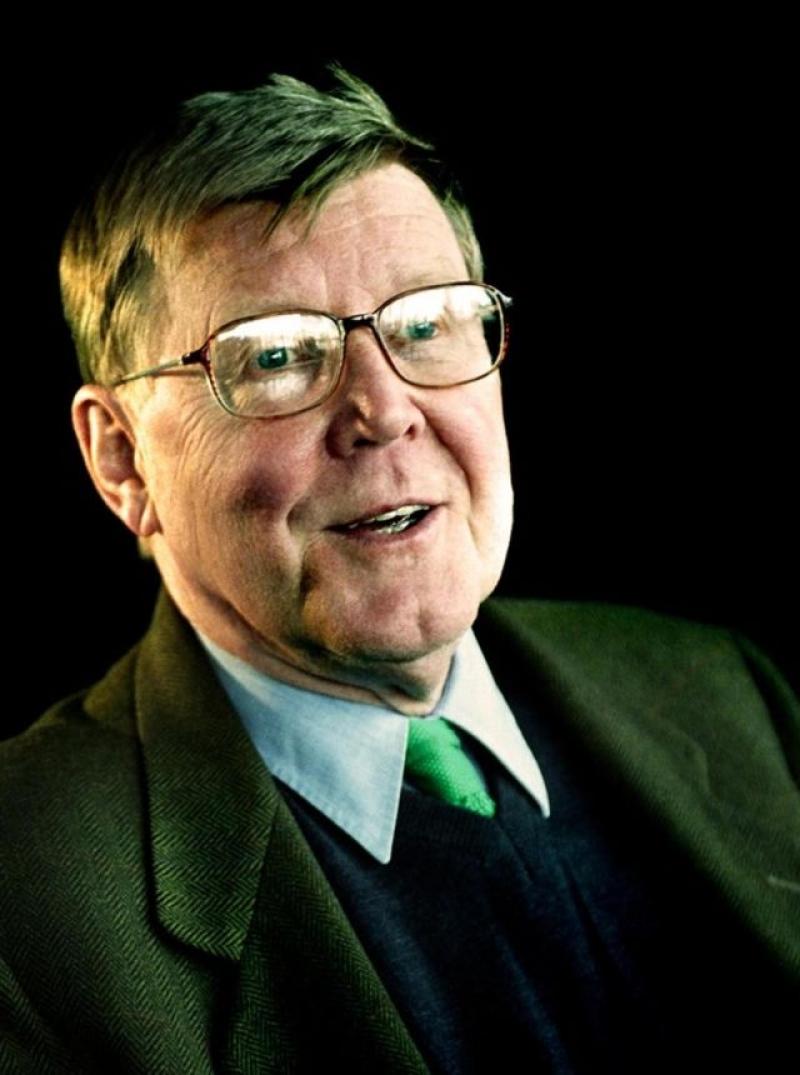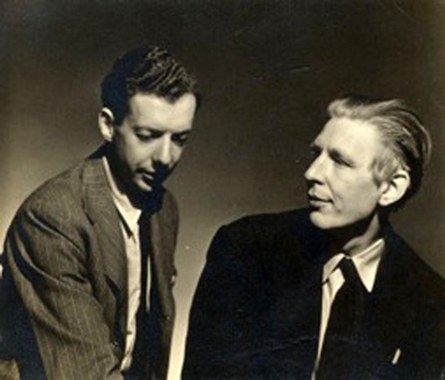Alan Bennett and The Habit of Art, More4 | reviews, news & interviews
Alan Bennett and The Habit of Art, More4
Alan Bennett and The Habit of Art, More4
The playwright talks A/B (that's to say W H Auden and Benjamin Britten)

Few theatrical collaborations have been as successful as that achieved over five plays, two films, several decades, and numerous awards by the playwright Alan Bennett and the director Nicholas Hytner, who had jointly made a habit of art well before Bennett decided to write a play of that very name, premiered in November 2009 at the National Theatre. Now, More4 has come along with a documentary chronicling the two men's collaboration on a work that is itself about a collaboration. And if Adam Low's behind-the-scenes take on an essentially private meeting of minds leaves you wanting more, well, even some of Bennett and Hytner in action is better than no glimpse of them at all.
I'm not sure that Alan Bennett and The Habit of Art will prove all that revealing for those already interested in and admiring of a playwright who, intriguingly, tends to resist being put under the spotlight himself, even as his own plays offer often deeply intimate, sometimes scabrous views of people no longer around to answer back. (Those who saw The Habit of Art during its extended run on the South Bank and then on tour will have learned more than they could ever have anticipated about the poet W H Auden's sexual, um, habits.) How open was Bennett willing to be, then, about a process - writing - that is itself notoriously tricky to dramatise? Enough to satisfy up to a point. And yet it was left to Hytner briefly to play the analyst, making clear that the play's original title, A/B, referred not just to its putative subjects, Auden and the composer Benjamin Britten (pictured below), but, of course, to the initials of its author. (This script's intermediary title, Caliban's Day, reported previously, went unmentioned.)
 Instead, we got footage of Bennett and Hytner reflecting both jointly, and individually, on the play's birth pangs, along with snippets of commentary from its enormously talented leading men, Alex Jennings (Britten) and Richard Griffiths (Auden), the latter of whom stepped in during rehearsals following the departure due to illness of original co-star Michael Gambon. (The full impact of Gambon's exit on the rest of the company was not explored.) This recent material was interspersed with a version of, presumably, much the same enquiry into Auden and Britten's own professional and personal dovetailing and eventual separation that Bennett must have engaged in himself, though Bennett's own preface to the published script of the play is, in fact, more complete on this front than the documentary manages to be.
Instead, we got footage of Bennett and Hytner reflecting both jointly, and individually, on the play's birth pangs, along with snippets of commentary from its enormously talented leading men, Alex Jennings (Britten) and Richard Griffiths (Auden), the latter of whom stepped in during rehearsals following the departure due to illness of original co-star Michael Gambon. (The full impact of Gambon's exit on the rest of the company was not explored.) This recent material was interspersed with a version of, presumably, much the same enquiry into Auden and Britten's own professional and personal dovetailing and eventual separation that Bennett must have engaged in himself, though Bennett's own preface to the published script of the play is, in fact, more complete on this front than the documentary manages to be.
That said, it was fascinating to be reminded of the extraordinary ravines of Auden's face and how aptly evocative they are of Gambon, next to whom the smooth-cheeked Griffiths was about as far-removed physically from the poet he was asked at the 11th hour to play as it was possible to be. (Hytner's finished stage production made a wry joke out of that very fact.) And one might have liked an even greater investigation into the process whereby an apparently straightforward bioplay morphed over successive drafts into a far more complex and moving look at the relationship between play and playwright as Bennett decided to encase his Auden/Britten face-off within a show that just happens to take place within the very rehearsal room that Bennett can by now call a second home - a play, in other words, first intended to lay bare the lives of others turned into a meditation in some way on its creator.
With musical scoring including Britten's always welcome Sea Interludes, Low's film hinted at a creative reckoning in Bennett that finds rough equivalents to Auden and Bennett in his play, images of Britten walking the Suffolk beach paralleled by shots of Jennings making his way down one or another backstage corridor at the National. I waited in vain for a recapitulation of that delicious final speech in Bennett's play in which Frances de la Tour's inimitable stage manager, Kay, spoke the author's title. But to see Bennett visibly worrying his latest creation at this point in a career spanning a half-century of kudos was to be reminded that the habit of art can be as hard as, with luck, it is glorious. Let's hope it's one habit Bennett doesn't kick any time soon.
Overleaf: more Alan Bennett
Few theatrical collaborations have been as successful as that achieved over five plays, two films, several decades, and numerous awards by the playwright Alan Bennett and the director Nicholas Hytner, who had jointly made a habit of art well before Bennett decided to write a play of that very name, premiered in November 2009 at the National Theatre. Now, More4 has come along with a documentary chronicling the two men's collaboration on a work that is itself about a collaboration. And if Adam Low's behind-the-scenes take on an essentially private meeting of minds leaves you wanting more, well, even some of Bennett and Hytner in action is better than no glimpse of them at all.
I'm not sure that Alan Bennett and The Habit of Art will prove all that revealing for those already interested in and admiring of a playwright who, intriguingly, tends to resist being put under the spotlight himself, even as his own plays offer often deeply intimate, sometimes scabrous views of people no longer around to answer back. (Those who saw The Habit of Art during its extended run on the South Bank and then on tour will have learned more than they could ever have anticipated about the poet W H Auden's sexual, um, habits.) How open was Bennett willing to be, then, about a process - writing - that is itself notoriously tricky to dramatise? Enough to satisfy up to a point. And yet it was left to Hytner briefly to play the analyst, making clear that the play's original title, A/B, referred not just to its putative subjects, Auden and the composer Benjamin Britten (pictured below), but, of course, to the initials of its author. (This script's intermediary title, Caliban's Day, reported previously, went unmentioned.)
 Instead, we got footage of Bennett and Hytner reflecting both jointly, and individually, on the play's birth pangs, along with snippets of commentary from its enormously talented leading men, Alex Jennings (Britten) and Richard Griffiths (Auden), the latter of whom stepped in during rehearsals following the departure due to illness of original co-star Michael Gambon. (The full impact of Gambon's exit on the rest of the company was not explored.) This recent material was interspersed with a version of, presumably, much the same enquiry into Auden and Britten's own professional and personal dovetailing and eventual separation that Bennett must have engaged in himself, though Bennett's own preface to the published script of the play is, in fact, more complete on this front than the documentary manages to be.
Instead, we got footage of Bennett and Hytner reflecting both jointly, and individually, on the play's birth pangs, along with snippets of commentary from its enormously talented leading men, Alex Jennings (Britten) and Richard Griffiths (Auden), the latter of whom stepped in during rehearsals following the departure due to illness of original co-star Michael Gambon. (The full impact of Gambon's exit on the rest of the company was not explored.) This recent material was interspersed with a version of, presumably, much the same enquiry into Auden and Britten's own professional and personal dovetailing and eventual separation that Bennett must have engaged in himself, though Bennett's own preface to the published script of the play is, in fact, more complete on this front than the documentary manages to be.
That said, it was fascinating to be reminded of the extraordinary ravines of Auden's face and how aptly evocative they are of Gambon, next to whom the smooth-cheeked Griffiths was about as far-removed physically from the poet he was asked at the 11th hour to play as it was possible to be. (Hytner's finished stage production made a wry joke out of that very fact.) And one might have liked an even greater investigation into the process whereby an apparently straightforward bioplay morphed over successive drafts into a far more complex and moving look at the relationship between play and playwright as Bennett decided to encase his Auden/Britten face-off within a show that just happens to take place within the very rehearsal room that Bennett can by now call a second home - a play, in other words, first intended to lay bare the lives of others turned into a meditation in some way on its creator.
With musical scoring including Britten's always welcome Sea Interludes, Low's film hinted at a creative reckoning in Bennett that finds rough equivalents to Auden and Bennett in his play, images of Britten walking the Suffolk beach paralleled by shots of Jennings making his way down one or another backstage corridor at the National. I waited in vain for a recapitulation of that delicious final speech in Bennett's play in which Frances de la Tour's inimitable stage manager, Kay, spoke the author's title. But to see Bennett visibly worrying his latest creation at this point in a career spanning a half-century of kudos was to be reminded that the habit of art can be as hard as, with luck, it is glorious. Let's hope it's one habit Bennett doesn't kick any time soon.
Overleaf: more Alan Bennett
Explore topics
Share this article
The future of Arts Journalism
You can stop theartsdesk.com closing!
We urgently need financing to survive. Our fundraising drive has thus far raised £49,000 but we need to reach £100,000 or we will be forced to close. Please contribute here: https://gofund.me/c3f6033d
And if you can forward this information to anyone who might assist, we’d be grateful.

Subscribe to theartsdesk.com
Thank you for continuing to read our work on theartsdesk.com. For unlimited access to every article in its entirety, including our archive of more than 15,000 pieces, we're asking for £5 per month or £40 per year. We feel it's a very good deal, and hope you do too.
To take a subscription now simply click here.
And if you're looking for that extra gift for a friend or family member, why not treat them to a theartsdesk.com gift subscription?

Add comment